#pm of India
Explore tagged Tumblr posts
Text
Comparing Donald Trump and Narendra Modi
#donald trump#narendramodi#President of US#PM of India#pmmodi#islamicterrorism#shuksgyan#idf#hamas#indiawithisrael#indianarmy#gaza strip#lebanon#make money online#col shukla
0 notes
Text
#Bollywood#Deepika Padukone#Features#Health#Mental Health#Narendra Modi#Pariksha Pe Charcha#PM of India#Prime Minister#Prime Minister of India#Social Media#bollywood hungama#bollywood news#trending bollywood news#trending news#trending#latest news#news
0 notes
Text
Kabir Sahib Comes to Meet His Pious Souls
It has been certified from Holy RigVeda Mandal 9 Sukt 82 Mantra 2 that Kabir Sahib comes from His native place Satlok to meet His pious souls.

0 notes
Link
#iyd2023#international yoga day#international yoga day 2023#yoga#yoga day 2023#pm of india#pm narendra modi#narendra modi#pm modi#vasudeva#one earth one family#june 21#june 2023#newsprovider#newsprovidernetwork#ind#ancient india#usa#health & fitness#health
1 note
·
View note
Text
youtube
On a bright day in New York, Prime Minister Narendra Modi arrived to a grand welcome by hundreds of enthusiastic Indians residing in the city. The event marked an eagerly anticipated moment as the Indian diaspora gathered to extend a warm reception to their esteemed leader. The arrival of PM Modi in New York and the warm reception by hundreds of Indians symbolized the vibrant spirit and unity of the Indian diaspora. It exemplified their collective aspirations and a shared commitment to the progress and prosperity of India.
#prime minister of India#PM Modi Arrives In New York#India US Relations#PM Modi's US Visit#Modi live news#PM Modi US Visit Live Updates#PM Modi US Visit 2023#PM Modi's US tour#PM Modi's US Congress speech#pm of India#Youtube
1 note
·
View note
Text
Indian Prime Minister Narendra Modi is, by some measures, the most popular leader in the world. Prior to the 2024 election, his Bharatiya Janata Party (BJP) held an outright majority in the Lok Sabha (India’s Parliament) — one that was widely projected to grow after the vote count. The party regularly boasted that it would win 400 Lok Sabha seats, easily enough to amend India’s constitution along the party's preferred Hindu nationalist lines.
But when the results were announced on Tuesday, the BJP held just 240 seats. They not only underperformed expectations, they actually lost their parliamentary majority. While Modi will remain prime minister, he will do so at the helm of a coalition government — meaning that he will depend on other parties to stay in office, making it harder to continue his ongoing assault on Indian democracy.
So what happened? Why did Indian voters deal a devastating blow to a prime minister who, by all measures, they mostly seem to like?
India is a massive country — the most populous in the world — and one of the most diverse, making its internal politics exceedingly complicated. A definitive assessment of the election would require granular data on voter breakdown across caste, class, linguistic, religious, age, and gender divides. At present, those numbers don’t exist in sufficient detail.
But after looking at the information that is available and speaking with several leading experts on Indian politics, there are at least three conclusions that I’m comfortable drawing.
First, voters punished Modi for putting his Hindu nationalist agenda ahead of fixing India’s unequal economy. Second, Indian voters had some real concerns about the decline of liberal democracy under BJP rule. Third, the opposition parties waged a smart campaign that took advantage of Modi’s vulnerabilities on the economy and democracy.
Understanding these factors isn’t just important for Indians. The country’s election has some universal lessons for how to beat a would-be authoritarian — ones that Americans especially might want to heed heading into its election in November.
-via Vox, June 7, 2024. Article continues below.
A new (and unequal) economy
Modi’s biggest and most surprising losses came in India’s two most populous states: Uttar Pradesh in the north and Maharashtra in the west. Both states had previously been BJP strongholds — places where the party’s core tactic of pitting the Hindu majority against the Muslim minority had seemingly cemented Hindu support for Modi and his allies.
One prominent Indian analyst, Yogendra Yadav, saw the cracks in advance. Swimming against the tide of Indian media, he correctly predicted that the BJP would fall short of a governing majority.
Traveling through the country, but especially rural Uttar Pradesh, he prophesied “the return of normal politics”: that Indian voters were no longer held spellbound by Modi’s charismatic nationalist appeals and were instead starting to worry about the way politics was affecting their lives.
Yadav’s conclusions derived in no small part from hearing voters’ concerns about the economy. The issue wasn’t GDP growth — India’s is the fastest-growing economy in the world — but rather the distribution of growth’s fruits. While some of Modi’s top allies struck it rich, many ordinary Indians suffered. Nearly half of all Indians between 20 and 24 are unemployed; Indian farmers have repeatedly protested Modi policies that they felt hurt their livelihoods.
“Everyone was talking about price rise, unemployment, the state of public services, the plight of farmers, [and] the struggles of labor,” Yadav wrote...
“We know for sure that Modi’s strongman image and brassy self-confidence were not as popular with voters as the BJP assumed,” says Sadanand Dhume, a senior fellow at the American Enterprise Institute who studies India.
The lesson here isn’t that the pocketbook concerns trump identity-based appeals everywhere; recent evidence in wealthier democracies suggests the opposite is true. Rather, it’s that even entrenched reputations of populist leaders are not unshakeable. When they make errors, even some time ago, it’s possible to get voters to remember these mistakes and prioritize them over whatever culture war the populist is peddling at the moment.
Liberalism strikes back
The Indian constitution is a liberal document: It guarantees equality of all citizens and enshrines measures designed to enshrine said equality into law. The signature goal of Modi’s time in power has been to rip this liberal edifice down and replace it with a Hindu nationalist model that pushes non-Hindus to the social margins. In pursuit of this agenda, the BJP has concentrated power in Modi’s hands and undermined key pillars of Indian democracy (like a free press and independent judiciary).
Prior to the election, there was a sense that Indian voters either didn’t much care about the assault on liberal democracy or mostly agreed with it. But the BJP’s surprising underperformance suggests otherwise.
The Hindu, a leading Indian newspaper, published an essential post-election data analysis breaking down what we know about the results. One of the more striking findings is that the opposition parties surged in parliamentary seats reserved for members of “scheduled castes” — the legal term for Dalits, the lowest caste grouping in the Hindu hierarchy.
Caste has long been an essential cleavage in Indian politics, with Dalits typically favoring the left-wing Congress party over the BJP (long seen as an upper-caste party). Under Modi, the BJP had seemingly tamped down on the salience of class by elevating all Hindus — including Dalits — over Muslims. Yet now it’s looking like Dalits were flocking back to Congress and its allies. Why?
According to experts, Dalit voters feared the consequences of a BJP landslide. If Modi’s party achieved its 400-seat target, they’d have more than enough votes to amend India’s constitution. Since the constitution contains several protections designed to promote Dalit equality — including a first-in-the-world affirmative action system — that seemed like a serious threat to the community. It seems, at least based on preliminary data, that they voted accordingly.
The Dalit vote is but one example of the ways in which Modi’s brazen willingness to assail Indian institutions likely alienated voters.
Uttar Pradesh (UP), India’s largest and most electorally important state, was the site of a major BJP anti-Muslim campaign. It unofficially kicked off its campaign in the UP city of Ayodhya earlier this year, during a ceremony celebrating one of Modi’s crowning achievements: the construction of a Hindu temple on the site of a former mosque that had been torn down by Hindu nationalists in 1992.
Yet not only did the BJP lose UP, it specifically lost the constituency — the city of Faizabad — in which the Ayodhya temple is located. It’s as direct an electoral rebuke to BJP ideology as one can imagine.
In Maharashtra, the second largest state, the BJP made a tactical alliance with a local politician, Ajit Pawar, facing serious corruption charges. Voters seemingly punished Modi’s party for turning a blind eye to Pawar’s offenses against the public trust. Across the country, Muslim voters turned out for the opposition to defend their rights against Modi’s attacks.
The global lesson here is clear: Even popular authoritarians can overreach.
By turning “400 seats” into a campaign slogan, an all-but-open signal that he intended to remake the Indian state in his illiberal image, Modi practically rang an alarm bell for constituencies worried about the consequences. So they turned out to stop him en masse.
The BJP’s electoral underperformance is, in no small part, the direct result of their leader’s zealotry going too far.
Return of the Gandhis?
Of course, Modi’s mistakes might not have mattered had his rivals failed to capitalize. The Indian opposition, however, was far more effective than most observers anticipated.
Perhaps most importantly, the many opposition parties coordinated with each other. Forming a united bloc called INDIA (Indian National Developmental Inclusive Alliance), they worked to make sure they weren’t stealing votes from each other in critical constituencies, positioning INDIA coalition candidates to win straight fights against BJP rivals.
The leading party in the opposition bloc — Congress — was also more put together than people thought. Its most prominent leader, Rahul Gandhi, was widely dismissed as a dilettante nepo baby: a pale imitation of his father Rajiv and grandmother Indira, both former Congress prime ministers. Now his critics are rethinking things.
“I owe Rahul Gandhi an apology because I seriously underestimated him,” says Manjari Miller, a senior fellow at the Council on Foreign Relations.
Miller singled out Gandhi’s yatras (marches) across India as a particularly canny tactic. These physically grueling voyages across the length and breadth of India showed that he wasn’t just a privileged son of Indian political royalty, but a politician willing to take risks and meet ordinary Indians where they were. During the yatras, he would meet directly with voters from marginalized groups and rail against Modi’s politics of hate.
“The persona he’s developed — as somebody kind, caring, inclusive, [and] resolute in the face of bullying — has really worked and captured the imagination of younger India,” says Suryanarayan. “If you’ve spent any time on Instagram Reels, [you’ll see] an entire generation now waking up to Rahul Gandhi’s very appealing videos.”
This, too, has a lesson for the rest of the world: Tactical innovation from the opposition matters even in an unfair electoral context.
There is no doubt that, in the past 10 years, the BJP stacked the political deck against its opponents. They consolidated control over large chunks of the national media, changed campaign finance law to favor themselves, suborned the famously independent Indian Electoral Commission, and even intimidated the Supreme Court into letting them get away with it.
The opposition, though, managed to find ways to compete even under unfair circumstances. Strategic coordination between them helped consolidate resources and ameliorate the BJP cash advantage. Direct voter outreach like the yatra helped circumvent BJP dominance in the national media.
To be clear, the opposition still did not win a majority. Modi will have a third term in office, likely thanks in large part to the ways he rigged the system in his favor.
Yet there is no doubt that the opposition deserves to celebrate. Modi’s power has been constrained and the myth of his invincibility wounded, perhaps mortally. Indian voters, like those in Brazil and Poland before them, have dealt a major blow to their homegrown authoritarian faction.
And that is something worth celebrating.
-via Vox, June 7, 2024.
#india#narendra modi#pm modi#modi#bjp#lok sabha elections#rahul gandhi#democracy#2024 elections#authoritarianism#anti authoritarian#good news#hope
747 notes
·
View notes
Text

Indian Prime Minister Narendra Modi hailed a "mega partnership" with the US during his meeting with President Donald Trump, announcing a deal to boost US oil and gas imports to India, aiming to reduce the trade deficit. Modi expressed openness to lowering tariffs, repatriating undocumented Indians, and purchasing US fighter jets, while Trump criticized India's high trade tariffs as a "big problem."
The leaders also discussed immigration, with Trump agreeing to extradite a suspect in the 2008 Mumbai attacks. Despite trade tensions, both emphasized strengthening ties, with Modi playfully adapting Trump's slogan: "Maga plus Miga equals Mega partnership for prosperity."
#general knowledge#generalknowledge#affairsmastery#current events#current news#upscaspirants#upsc#india#generalknowledgeindia#world news#india news#breaking news#news#government#business news#pm modi#modi#narendra modi#trumps#donald trump#president donald trump#trump administration#trump#america#jd vance#president trump#usa news#us politics#politics#usa
55 notes
·
View notes
Text
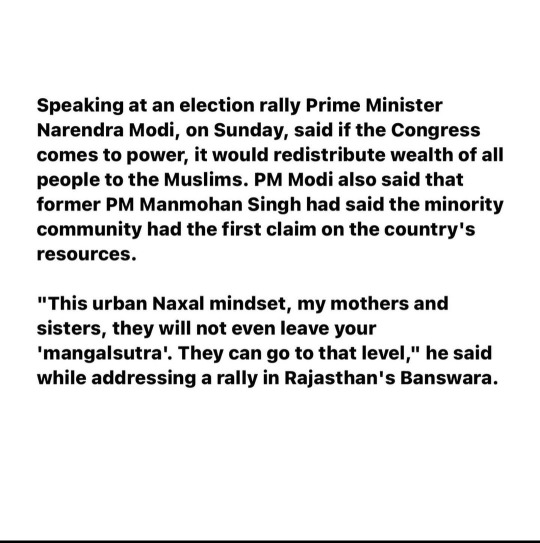
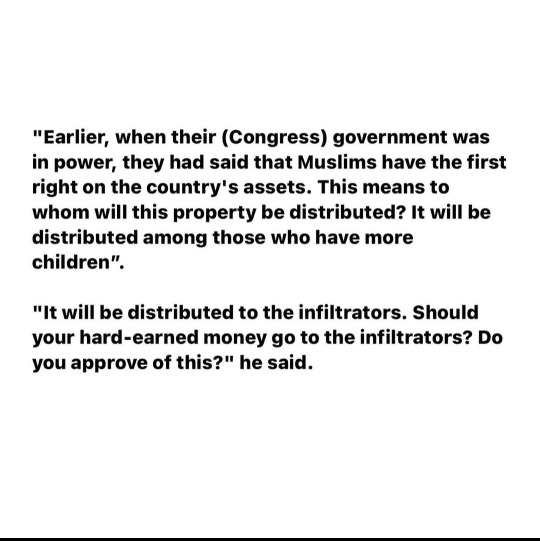
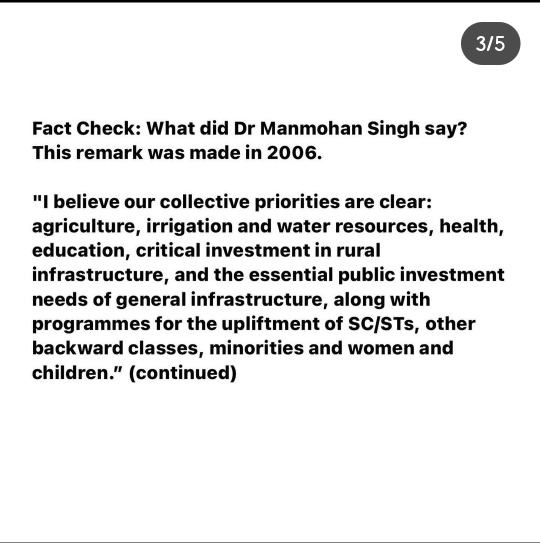
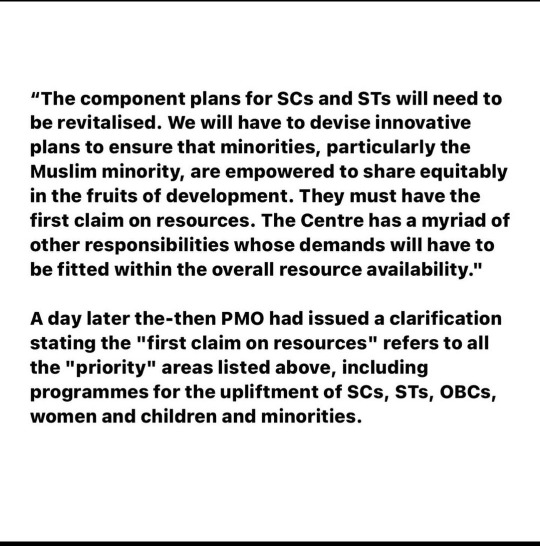
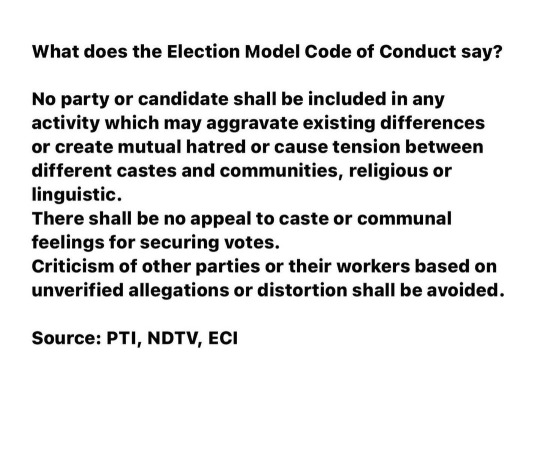
So now what? The PM of this country has started directly attacking a community. I have put the whole thing together because obviously I will have "people" telling me that the majority matters or whatever they say. But are we really this blind to not notice what is happening? The ruling party is clearly using religion and communal tension (which they obviously instigated) to hide their inadequacies from the public. This is a tale as old as time: the ruling government has been using divide and rule policies to exploit and manipulate the public. Even after 10 years of their rule, is the party's only way to gather votes? By causing division between communities?
I am scared about the future. The rising tension between communities scares me. I await with bated breath the day it will finally burst. And you know who will be affected by this? Not the government, not the leaders, not those businessmen or celebrities. It will be you and me, no matter which community we belong to. We will be affected.
#desiblr#hindublr#pm modi#election 2024#indian politics#anti modi#modi government#india#government of india#divide and rule#communal tension
212 notes
·
View notes
Text
honestly i don't know why people are not paying attention to the fact that India, largest democracy in the world, is shifting to authoritarianism, is openly supporting Israel to the point that Israel is telling it's citizens to be happy that Maldives banned them and they can now explore Lakshadweep.
like i don't know what the result of the election will be but it will be very concerning if modi won by a very large margin
78 notes
·
View notes
Text

remember that brahminism is a form of colonialism too and savarnas can't just move past caste merely by losing their last names, supporting affirmative action, voting out modi/bjp or being allies to the oppressed generally: they have to give up the wealth they stole, and power over territories they have violently occupied.
they have to change their relationship with the oppressed materially, by actively transferring assets they have stolen from bahujan communities and the surpluses they have "earned" by enslaving them for centuries, and by resisting other savarnas who come in the way of this.
#remember#reminder#brahminism#colonialism#colonial violence#colonial america#colonial history#colonialization#coloniality#savarnas#caste system#caste#pm modi#modi#bjpmafia#anti bjp#bjpnews#bjpparty#bjp#indian#american indian#india love#india westbrooks#travel agency in india#india#ausgov#politas#auspol#tasgov#taspol
20 notes
·
View notes
Text



47 notes
·
View notes
Link
International Yoga Day is observed on June 21st every year. It was first proposed by the Prime Minister of India, Narendra Modi, during his speech at the United Nations General Assembly in 2014. He highlighted the importance of yoga for overall well-being and harmony.
#iyd2023#international yoga day#international yoga day 2023#yoga#yoga day 2023#pm of india#pm narendra modi#narendra modi#pm modi#vasudeva#one earth one family#june 21#june 2023#newsprovider#newsprovidernetwork#ind#ancient india#usa#health & fitness#health
1 note
·
View note
Text
#tiktok#India#indian#abc#protect journalists#journalists#free speech#freedom of press#freedom of speech#australia#avani dias#sikhism#sikhcommunity#sikh separatist#sikh#pm modi#prime minister modi#modi news#narendra modi#modi
14 notes
·
View notes
Text
According to IQAir, a Swiss-based Air Quality Index (AQI) monitoring group, pollution levels in several parts of Delhi touched the 500 mark. AQI measures the levels of particulate matter, also called PM 2.5, in the air. These tiny particles can enter the lungs and cause a host of diseases. According to WHO guidelines, air with AQI values at or below 100 is considered to be satisfactory for breathing, while readings in the 400-500 range denote that pollution levels are "severe" in an area. Delhi was the most polluted capital city in the world in 2023, according to IQAir. India was also ranked as the world's third-most polluted country after neighbours Bangladesh and Pakistan, IQAir said.
Cherylann Mollan, ‘Delhi chokes as air pollution turns 'severe'’, BBC
6 notes
·
View notes
Text

US intelligence chief Tulsi Gabbard praised Prime Minister Narendra Modi’s recent visit, calling it a key step in shaping the India-US partnership. Currently in India for high-level security meetings, Gabbard discussed shared threats, particularly Islamist terrorism, with NSA Ajit Doval and Defence Minister Rajnath Singh.
She emphasized that President Trump is firmly committed to countering terrorism and strengthening ties with India. Gabbard, a practicing Hindu, also highlighted China’s strategic challenges and sees immense opportunities in deepening India-US cooperation. She will further discuss these issues at the upcoming Raisina Dialogue.
#general knowledge#affairsmastery#generalknowledge#current events#current news#world news#upscaspirants#upsc#generalknowledgeindia#india#breaking news#news#usa news#government#narendra modi#pm modi#modi#india news#indian#president donald trump#trump administration#president trump#donald trump#trump#tulsi gabbard#usa#united states#america#united states of america#rajnath singh
22 notes
·
View notes
